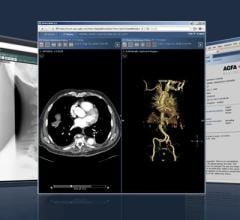
June 27, 2016 — IBM announced it has formed a Watson Health medical imaging collaborative, a global initiative comprised of more than fifteen leading health systems, academic medical centers, ambulatory radiology providers and imaging technology companies. The collaborative aims to bring cognitive imaging into daily practice to help doctors address breast, lung and other cancers; diabetes; eye health; brain disease; and heart disease and related conditions, such as stroke.
Members of the collaborative plan to put Watson to work to extract insights from previously ‘invisible’ unstructured imaging data and combine that with a broad variety of data from other sources. In doing so, the efforts may help physicians make personalized care decisions relevant to a specific patient while building a body of knowledge to benefit broader patient populations. This information may include data from electronic health records, radiology and pathology reports, lab results, doctors’ progress notes, medical journals, clinical care guidelines and published outcomes studies.
Foundational members for the collaborative include Agfa HealthCare, Anne Arundel Medical Center (Md.), Baptist Health South Florida, Eastern Virginia Medical School, Hologic Inc., ifa systems AG, inoveon, Radiology Associates of South Florida, Sentara Healthcare, Sheridan Healthcare, Topcon, UC San Diego Health, University of Miami Health System, University of Vermont Health Network and vRad, as well as Merge Healthcare, an IBM company. As the work of the collaborative evolves Watson’s rationale and insights will evolve, informed by the latest combined wisdom of these organizations.
Initial plans include training Watson and evaluating potential new offerings in a variety of patient care environments ranging from stand-alone ambulatory settings to integrated health delivery networks. The aim in doing so is to gather data based on diverse real-world experience and to share findings to inform how the medical community might reduce operational and financial inefficiencies, improve physician workflows, and adopt a patient-focused approach to improving patient care and outcomes. Further, medical experts could determine how to integrate Watson into the existing health IT systems of the imaging technology companies in the collaborative. For example, integrating with electronic health records and picture archiving and communication systems (PACS) to deliver cognitive insights to providers within existing clinical workflows.
“There is strong potential for systems like Watson to help to make radiologists more productive, diagnoses more accurate, decisions more sound and costs more manageable,” said Nadim Michel Daher, a medical imaging and informatics analyst for Frost & Sullivan. “This is the type of collaborative initiative needed to produce the real-world evidence and examples to advance the field of medical imaging and address patient care needs across large and growing disease states.”
Recent studies reveal that inadequate, unnecessary, uncoordinated, and inefficient care and suboptimal business processes eat up at least 35 percent — and maybe over 50 percent — of the more than $3 trillion the United States spends annually on healthcare. That suggests more than $1 trillion is being squandered. Watson Health aims to help healthcare professionals improve care and reduce waste by enabling enhanced utilization of medical imaging data and providing cognitive offerings and services that support a doctor’s ability to make tailored medical recommendations personalized to each patients’ unique needs.
Members of the collaborative are expected to team with Watson Health cognitive computing experts to train Watson on cardiovascular disease, eye health and other conditions using data provided by the members of the collaborative or from population-based disease registries, which house millions of de-identified cases from around the world. To help create new solutions powered by Watson, the industry members of the collaborative could integrate Watson into their workflow systems or image management software.
For example, members of the collaborative could train Watson to detect cardiovascular disease early and identify commonly overlooked heart health conditions such as congestive heart failure or myocardial infarction (heart attack). For early disease detection, Watson could be trained to analyze and ‘score’ a coronary angiogram (a video image of a beating heart) for physician review. This score, commonly known as a SYNTAX score, is one factor used by physicians to decide to refer a patient with coronary artery disease to a minimally invasive stent procedure or a coronary artery bypass graft procedure. In regard to commonly overlooked heart conditions, Watson could be trained to identify congestive heart failure early by ‘learning’ how patients’ hearts are likely to start failing and then monitoring disease progression. Further, Watson could aid physicians in discerning chest pain likely to indicate a future heart attack from chest pain related to a different health condition. Chest pain is a leading reason people visit a hospital emergency room each year, yet of the estimated 7 million people with chest pain who make it to an emergency room (ER), as much as 2 percent may suffer a heart attack at home after a hospital discharge because signs of imminent heart attack were missed.
For more information: www.ibm.com/watson


 May 24, 2024
May 24, 2024 








